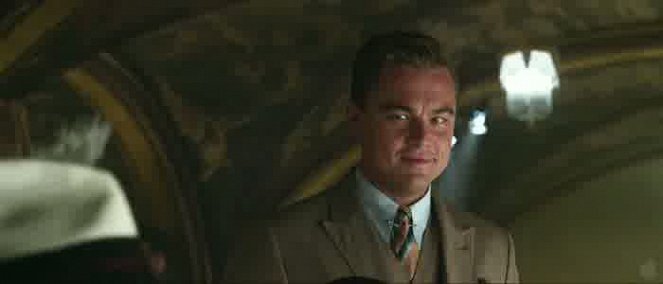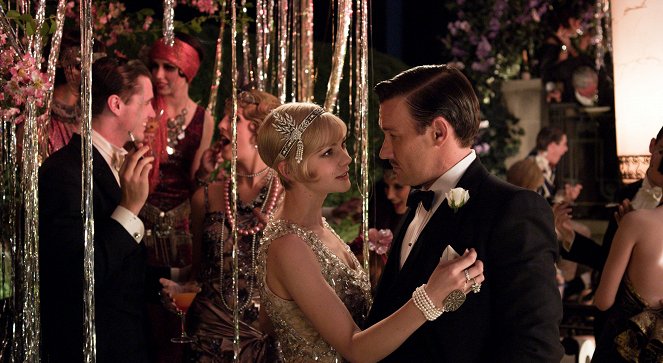Reżyseria:
Baz LuhrmannZdjęcia:
Simon DugganMuzyka:
Craig ArmstrongObsada:
Leonardo DiCaprio, Tobey Maguire, Carey Mulligan, Joel Edgerton, Isla Fisher, Jason Clarke, Elizabeth Debicki, Jack Thompson, Amitabh Bachchan (więcej)VOD (2)
Opisy(1)
Film Wielki Gatsby przedstawia losy niedoszłego pisarza Nicka Carrawaya, który opuszcza Środkowy Zachód i przybywa do Nowego Jorku wiosną 1922 roku, w epoce upadającej moralności, połyskliwego jazzu, królów przemytu alkoholowego i szybujących w górę akcji. Podążając za swoim amerykańskim snem, Nick zamieszkuje w sąsiedztwie tajemniczego, urządzającego liczne przyjęcia milionera Jaya Gatsby’ego, po drugiej stronie zatoki, nad którą mieszka jego kuzynka Daisy wraz ze swym żądnym romansów, arystokratycznym mężem Tomem Buchananem. Nicka pochłania czarujący świat niezwykle zamożnych ludzi, ich iluzji, miłości i kłamstw. Obserwując go od środka i z zewnątrz, Nick pisze opowieść o niemożliwej miłości, snach nie na sprzedaż oraz wysokooktanowej tragedii i stawia przed nami lustro, w którym widzimy odbicie naszej współczesności. (Warner Bros. PL)
(więcej)Materiały wideo (28)
Recenzje (15)
This theatrical love triangle has lively visuals, but a dull soul. Baz Luhrmann uses all the tricks that worked in Moulin Rouge! but does not come even close to depth of the portrayal of of tragic love achieved in the musical. We get to the character of Gatsby slowly, with great anticipation, and Leonardo DiCaprio looks good in his pastel suits (like everyone else), but his character paradoxically turns out to be the most impersonal and contradictory element of the film. We don’t really care about him, even though the film tells the story of his journey towards his dream, embodied by the beautiful Daisy. Carey Mulligan is merely an ornament, Joel Edgerton as her gruff husband is more noticeable than DiCaprio’s Gatsby. The only natural character is the “representative of the people” played by Tobey Maguire. Moulin Rouge! was energized and brought to life by its original energetic and emotionally engaging songs. The Great Gatsby pulls out Jay-Z’s overused hits (identifying with New York) and futilely tries to add a romantic dimension to a book of opulent pictures by using a captivating song by Lana Del Rey. Such a powerful theme, so many big thoughts ... And the viewer’s eyes will remain dry. ___ Second viewing: The scene of the confrontation of characters in the hotel room – if the whole film was done so intimately, in a psychologically concentrated fashion and dramaturgically sensitively, i.e. without unnecessary formal excesses and, in terms of music, satisfied itself with Lana Del Rey in key scenes, it could have been extraordinary.
()
Two and a half stars for the soundtrack, which is not even properly used. The film itself didn’t do for me, but I will give it another chance after some time. The first time I watched it, it irritated me in a similar way as the beginning of Moulin Rouge! … But whereas Moulin Rouge got better as the story progressed, Gatsby irritated me throughout. Maybe next time.
()
It starts as intoxicating kitsch, then it becomes a tiresome mess stumbling on both feet. As far as gimmicky camera tricks and image wizardry go, Luhrmann is confident, but he fails in simple meaningful storytelling and in trying to get under the skin of the characters. I've mentioned kitsch – all those lavish parties make you feel like you're looking at a big garden dwarf, festooned with colourful ribbons and flashing light bulbs. But when it comes to feelings, it's like a shallow story in a girlie magazine, kind of plucking the daisy "He likes you, he likes you not, he likes you, he likes you not, he'll leave with you, he won't leave with you.....". Thank goodness for at least two things: Edgerton's manly Buchanan, the only full-blooded character in the entire panopticon, and the reunion scene between Gatsby and Daisy – the only moment in the entire film where you can feel any emotion. Luhrmann is getting a little stale.
()
The make-up and lighting make Gatsby look like a leaked Madame Tussaud model. Luhrmann's lust for the most effective imagery neuters the sketches of everyone else, making The Great Gatsby the most poorly narrated (and subjectively longest) blockbuster of the season; a good party ends without a hangover, but here you're dragged to the sidelines with a queasy stomach before its climax.
()
The more problematic the film, the more you expect a standard adaptation of a classic book. The world of New York high society simultaneously disgusts and attracts Nick. He is aware of his ambivalent position as a person both on the inside and on the outside, a person who simultaneously wants and doesn’t want to be part of the story being told, and he is not only able to reflect that position, but he has to reflect it in his own interest. The narrator’s deeply personal relationship to “his” story and to the characters is emphasised by the fact that for Nick, retrospectively reconstructing who Gatsby actually was is a form of psychotherapy (similarly to the way that the search for the meaning of the word “rosebud” was an attempt to find the truth in Citizen Kane). Given the obvious hints that Nick is Fitzgerald’s alter-ego, writing (or rather retelling) as a form of therapy becomes one of the key motifs of the film. Also, the storyline involving the relationship between Nick and Gatsby (which strikingly lends itself to a queer reading) is ultimately the most authentic aspect of the film and, together with the therapeutic level of the narrative, rationalises the film’s double ending. ___ Like the narrator, Luhrmann sympathises with the characters, yet he places them in the surreal Technicolor world of major studio films, thus turning them into mere abstract ideas. In this rendering, Gatsby is merely the essence of the American mentality (the tenacious, self-destructive effort to achieve a particular ideal) and DiCaprio plays him accordingly. ___ Highlighting the narrative framework in comparison with the book (in which Nick simply tells the story, and why and to whom he is telling it are not important) is not a gratuitous attempt to bring a bit of tabloid subtext into the story – it rhythmises the narrative (“stepping out” of the story occurs at regular intervals) and influences its style. At the beginning, Nick speaks rapidly, as he is fascinated by all of the new stimuli and feels the need to quickly express all of his impressions. The cuts are abrupt and unexpected, and the shots are so short that it is difficult to find one’s bearings in them (it almost seems that there is a separate shot for every sentence). The camera never stops moving and, more so than later in the film, Luhrmann uses lap dissolves to create the impression that one shot blends into the next. The images sparkle, dazzling us with intense colours and CGI effects. We later become aware of the significance of the Sirk-like excessive work with colours, when it becomes clear why Myrtle was characterised in red and Gatsby in blue, or why it is important to know what colour Gatsby’s car is. The soundtrack is just as boisterous as the visual component of the narrative. ___ The choice of songs is the most striking (or rather loudest) link between today and the period in which the narrative is set. The soundtrack’s producers succeeded in selecting songs that can be imagined as contemporary alternatives to the music that was popular in the Roaring Twenties, though there is again a certain exaggeration (the shot of a car full of black people is accompanied by gritty gangsta rap). With its genre diversity, the soundtrack serves as an effective way to map the changes in mood that the film undergoes. ___ The film settles into a calmer, more classic style only after Nick’s story stabilises and focuses on Jay Gatsby as a man who personifies the limits of the American desire for success. The shots are longer, the narrator’s vocabulary is more colourful (which is also connected to the fact that Nick starts typing instead of speaking) and the lighting of the scenes is more natural. Together with the slowing of the film’s pace, the primary sources of inspiration also change. Whereas the noisy and flamboyant first third takes inspiration from the musicals of Busby Berkeley (and, I would venture to say, from the extravagant French epic productions of Marcel L’Herbier and other poetic realists), the film gradually progresses through excursions into gangster, adventure and war movie to a combination of social drama (The Crowd) and melodrama. Due to the doubling of the romantic storyline, however, it is rather an ironic commentary on the genre of melodrama (a sign that Luhrmann was not entirely serious is the pool shot in the film’s climax, which makes reference to the opening minutes of one of Hollywood’s most biting satires). ___ Because of the lifeless characters and excessive care taken to ensure that viewers understand exactly what is happening in the story, The Great Gatsby is an emotionally apathetic and laughably simple film. However, it is not a nonconceptual patchwork for lovers of pretty, shiny objects and expensive champagne (of one particular brand), though it does at first deceptively seem to be just that, even more so than Luhrmann’s earlier attempts to make the past present. 80%
()
(mniej)
(więcej)



Reklama